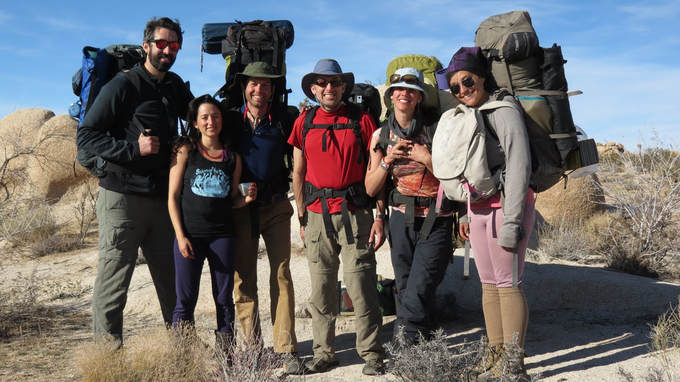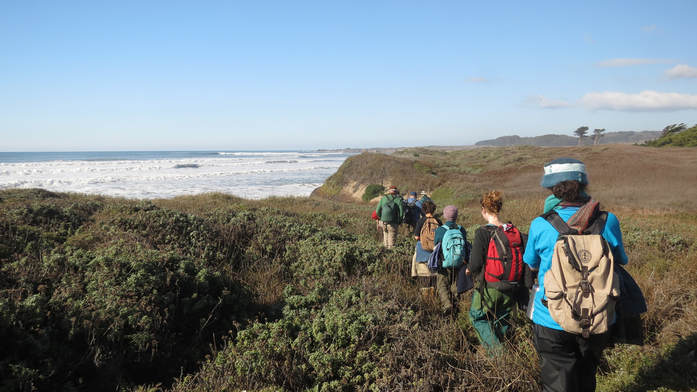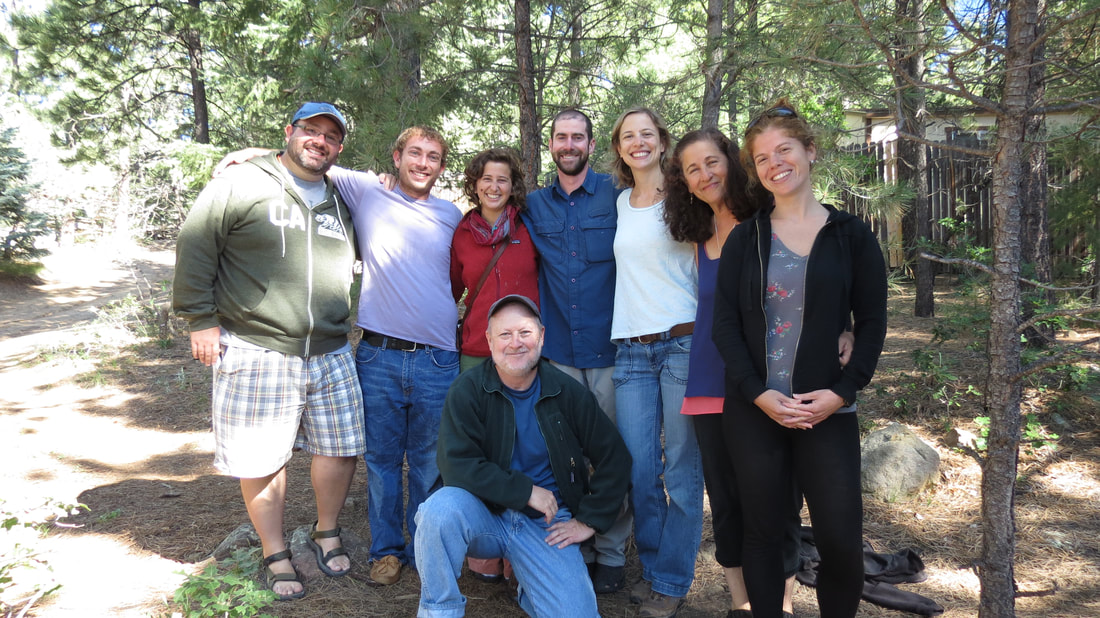TorahTrek Guides Track Curriculum

Below is the curriculum of the last cohort of the TorahTrek Guides Track.
Successful spiritual, nature educators must have deep spiritual experience in nature and a basic knowledge of Judaism and ecology. The training consists of two seven-day retreats, a third ten-day retreat (including a three-day solo in wilderness) and regular study between retreats over the academic year.
Retreat 1 (August 11-18, 2015, Jackson Hole, Wyoming)
The first retreat, in a mountain setting with stunning views of the Tetons, teaches the art of listening for God in wilderness. Guides camp together and begin a rigorous program that immerses them deeply in nature. Every day participants learn mindfulness, meditative walking, Hebrew chant, chi quong moving meditation, and other "deep listening" techniques. Each day they spend an increasing amount of time in hitbodedut (alone time dedicated to spiritual practice) at a solo site in the wild. The retreat concludes with a full day of hitbodedut.
Rigorous safety protocols are followed in the hitbodedut practice.
Retreat 2 (December 20-27, 2015, Joshua Tree, CA)
In a desert setting near Joshua Tree National Park, participants respond to what they learn from mindful listening for God. Following Rabbi Comins' book, Making Prayer Real, participants are encouraged to find their personal prayer voice, and make liturgical prayer their own. Drawing on his experience as an Israeli desert guide, Rabbi Comins teaches "Desert Torah" and processes the day's learning. The retreat culminates with an overnight solo, a day and a half of hitbodedut.
Retreat 3 (May 26-June 5, 2016, Sierra Nevada Mountains, CA)
The third retreat builds on the previous themes of mindfulness and prayer. Participants now direct their attention primarily inward, engaging in self-reflection for the purposes of teshuvah—for moral refinement, personal growth and spiritual renewal. At the center is a three-day solo of hitbodedut in wilderness, a powerful experience that almost always has an enormous impact on a person's spirit and their relationship with God.
Successful spiritual, nature educators must have deep spiritual experience in nature and a basic knowledge of Judaism and ecology. The training consists of two seven-day retreats, a third ten-day retreat (including a three-day solo in wilderness) and regular study between retreats over the academic year.
Retreat 1 (August 11-18, 2015, Jackson Hole, Wyoming)
The first retreat, in a mountain setting with stunning views of the Tetons, teaches the art of listening for God in wilderness. Guides camp together and begin a rigorous program that immerses them deeply in nature. Every day participants learn mindfulness, meditative walking, Hebrew chant, chi quong moving meditation, and other "deep listening" techniques. Each day they spend an increasing amount of time in hitbodedut (alone time dedicated to spiritual practice) at a solo site in the wild. The retreat concludes with a full day of hitbodedut.
Rigorous safety protocols are followed in the hitbodedut practice.
Retreat 2 (December 20-27, 2015, Joshua Tree, CA)
In a desert setting near Joshua Tree National Park, participants respond to what they learn from mindful listening for God. Following Rabbi Comins' book, Making Prayer Real, participants are encouraged to find their personal prayer voice, and make liturgical prayer their own. Drawing on his experience as an Israeli desert guide, Rabbi Comins teaches "Desert Torah" and processes the day's learning. The retreat culminates with an overnight solo, a day and a half of hitbodedut.
Retreat 3 (May 26-June 5, 2016, Sierra Nevada Mountains, CA)
The third retreat builds on the previous themes of mindfulness and prayer. Participants now direct their attention primarily inward, engaging in self-reflection for the purposes of teshuvah—for moral refinement, personal growth and spiritual renewal. At the center is a three-day solo of hitbodedut in wilderness, a powerful experience that almost always has an enormous impact on a person's spirit and their relationship with God.

Course
Between retreats participants maintain the community and study with Rabbi Comins and Rabbi Natan Margalit via on-demand video lectures and the cohort's virtual classroom on the TorahTrek website, and monthly conference calls. Rabbi Margalit teaches "eco-Torah," covering the basic concepts and texts that Jewish environmental educators need to know. Rabbi Comins presents an eclectic range of subjects—drawing on traditional, Jewish texts, Judaica scholarship, contemporary philosophy and nature writing—to ground the spiritual practices he teaches on the retreats. While the course is in development, below is the working syllabus.
The best way to further understand the Guides Track curriculum and Rabbi Comins' approach to Jewish wilderness spirituality is to read his book A Wild Faith. To read excerpts from A Wild Faith, click here. To read his article, "Jewish Wilderness Spirituality," click here.
Between retreats participants maintain the community and study with Rabbi Comins and Rabbi Natan Margalit via on-demand video lectures and the cohort's virtual classroom on the TorahTrek website, and monthly conference calls. Rabbi Margalit teaches "eco-Torah," covering the basic concepts and texts that Jewish environmental educators need to know. Rabbi Comins presents an eclectic range of subjects—drawing on traditional, Jewish texts, Judaica scholarship, contemporary philosophy and nature writing—to ground the spiritual practices he teaches on the retreats. While the course is in development, below is the working syllabus.
The best way to further understand the Guides Track curriculum and Rabbi Comins' approach to Jewish wilderness spirituality is to read his book A Wild Faith. To read excerpts from A Wild Faith, click here. To read his article, "Jewish Wilderness Spirituality," click here.
Course Syllabus
Rabbi Natan Margalit
Rabbi Mike Comins
- Genesis, Chapters 1, 2 and 3: The Doubleness of Humanity: Adam One and Adam Two; humans as creatures and as creator
- Noah and the Covenant: Laws of nature or miracle?; bio-diversity
- No Waste Bal Tashchit: Rain versus irrigation economies; the waste culture and the no-waste culture
- The Bible as an Agrarian Book: Ellen Davis, Wendel Berry and the biblical argument for small farming
- The Rabbis and the Organic Torah: How the rabbis took an indigenous world view and translated it into Diaspora
- Kashrut and Eco-Kashrut: The ethical and ecological basis for kashrut
- Mitzvah and the Tipping Point: How to make a difference Jewishly and ecologically; the way of Torah and the way of natural systems
- The Holiness of Israel, the Holiness of the Earth
- The New Science and Religion - Emergence and God: paradigm shift to re-approachment of science and religion
Rabbi Mike Comins
- Biblical Theology: Nature in the Worldviews of J, P and D
- Desert in the Torah; Torah in the Desert
- Judaism as a Spiritual Practice: A Spiritual Dynamics Approach to God, Torah and Mitzvot
- Putting Heart into Words: Cultivating one's Personal Prayer Voice
- Blessings and Liturgical Prayer in Nature
- Nature as Metaphor; Nature as Thou: The Place of Nature in Classic Western Theology and Different Approaches to Spiritual Practice in the Natural World
- Finding God in Nature 1: Martin Buber's I and Thou
- Finding God in Nature 2: Awe and Wonder in the Thought of Abraham Joshua Heschel
- Finding God in Nature 3: Recovering and updating Biblical views on God and the world. (Lessons from Benjamin Sommer's The Bodies of God, Theodore Hiebert's The Yahwist's Landscape and James Kugel's The God of Old)
- Creation and Evolution in the Theology of Arthur Green
- Bradley Artson and Jewish Process Theology
- Robert Gordis and the Role of Nature in the Book of Job
- The Spell of the Sensuous and Becoming Animal: the Jewish roots and sensibilities of eco-philosopher David Abram
